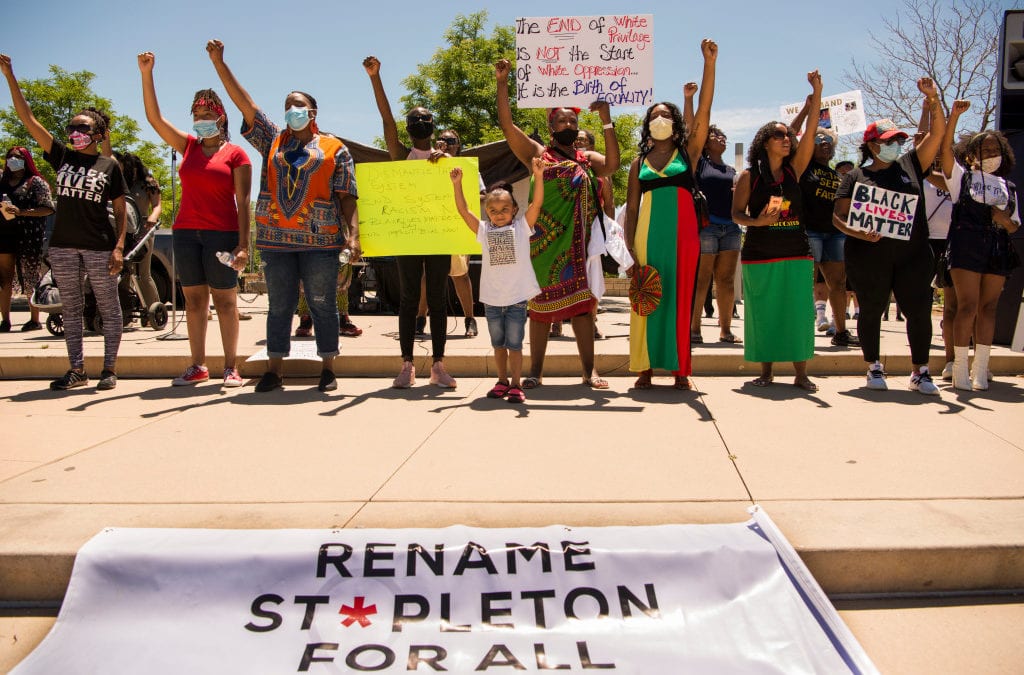The Southern Poverty Law Center identified 17 hate groups operating in Colorado in 2020, a decline from previous years likely driven by the pandemic and extremists moving their activity into private, encrypted online chatrooms where it is more difficult to track them.
Nationally, the SPLC identified 838 active hate groups, a decrease from the 940 documented in 2019 and the record-high 1,020 in 2018. But the civil rights group, based in Montgomery, Alabama, said the decline in tracked groups does not indicate extremism is waning.
“For three decades, we have attempted to sound the alarm about these groups, their growth and the dangers they pose,” Margaret Huang, president and chief executive officer of the SPLC, said in a news release. “It is clearer now than ever that our nation faces an increasingly dangerous threat from home-grown extremists ranging from anti-government militias to hate groups and white supremacists.”
On January 27, the U.S. Department of Homeland of Security issued a national terrorism advisory to warn Americans that violent domestic extremists remain a threat in the United States and those extremists could attack government facilities. The advisory came after the Jan. 6 riot at the U.S. Capitol by former President Donald Trump’s supporters.
In its October Homeland Threat Assessment, the homeland security department named U.S.-based violent extremists as “the most persistent and lethal threat” to the country. Small groups and lone offenders “have capitalized on increased social and political tensions in 2020, which will drive an elevated threat environment at least through early 2021. Violent extremists will continue to target individuals or institutions that represent symbols of their grievances, as well as grievances based on political affiliation or perceived policy positions,” the report said.
In Colorado, the hate groups identified in the 2020 report range from white nationalist groups to organizations that denounce LGBTQ people and Muslims:
In the past, some Colorado groups on the list have disputed their designation as a hate group. For example, the Family Research Institute’s leadership has said homosexuality should be discouraged and made illegal again, but does not agree that it is a hate group.
Nationally, critics of the SPLC’s list have accused the organization of using broad criteria to designate what makes up a hate group. But no one has successfully challenged the label in court.
In Colorado, those who monitor extremism reported an aggressive rise in paramilitary groups in 2020, but those groups, such as the Three Percenter movement, are not listed in the Southern Poverty Law Center’s 2020 Year in Hate report.
Still, links between militias and anti-government groups and hate groups were drawn in the SPLC’s report.
“The insurrection at the Capitol was the culmination of years of right-wing radicalization. Most recently, it was the product of Donald Trump’s support for and encouragement of radicalized individuals and groups to buy into conspiracy theories about a ‘stolen election,’” Susan Corke, director of the SPLC’s Intelligence Project, said. “Trump may no longer be in the White House, but the white nationalist and extremist movement he emboldened and incited to violence is not going anywhere – and may grow more dangerous to our country.”
The proliferation of internet platforms that cater to extremists allows individuals to engage with potentially violent movements like QAnon and Boogaloo without being card-carrying members of a particular group. Boundaries of hate groups and far-right ideologies have blurred, the 2020 Year in Hate report said
The Ku Klux Klan no longer carries weight with younger extremists who are more attracted to groups such as the Proud Boys, which has been active in Colorado and whose members participated in the attack on the Capitol. The KKK once wielded power in Colorado politics, but it is no longer welcome with one Denver neighborhood changing its name last summer to Central Park to sever ties with a former mayor associated with the Klan.
In 2020, Klan chapters dwindled nationally to 25, down from 47 in 2019 and down significantly from years past, when there were typically about 150 chapters in any given year. This year, no active Klan groups were listed in Colorado although they appeared on the annual report as recently as 2017.
This content was originally published here.
